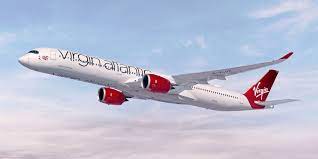
The historic flight will only use environmentally friendly aircraft fuel.
The British carrier Virgin Atlantic recently announced it will execute the first net-zero emissions trip across the Atlantic, heralding the start of a historic year for the aviation sector. The journey, scheduled to depart from London Heathrow and arrive at New York JFK in late 2023, will use only sustainable aviation fuel, or SAF.
The airline intends to deploy SAF, which is made from waste oils and fats (such as used cooking oil), in one of their premier Boeing 787 aircraft powered by Rolls-Royce Trent 1000 engines. No changes to the aircraft or engines are required, according to Virgin Atlantic, for the test flight. Low-carbon SAFs are "drop-in" fuels because they can be used with current aircraft engines and supply infrastructure since they are made from a variety of non-fossil fuel sources, such as cooking oil and agricultural waste.
Virgin Atlantic claims that using 100% SAF lowers carbon emissions by almost 70% as compared to using regular jet fuel. Investment in carbon-removal credits will be used to meet the remaining net zero-emissions objective for the flight. Net zero emissions mean that the amount of greenhouse gases emitted is equal to the number of greenhouse gases removed.
The flight, which is partly paid for by a £1 million ($1.22 million) grant from the UK government, is meant to help collect data and show that jets powered by 100% SAF are safe and possible as the global aviation industry moves toward broader goals of reducing carbon emissions.
The study and outcomes of the trip, according to Virgin Atlantic CEO Shai Weiss, "will be a big step in fast-tracking SAF deployment throughout the aviation sector and support the investment, cooperation, and urgency needed to develop SAF at scale."
Scheduled to fly from London Heathrow to New York JFK in late 2023. https://t.co/Y4GAokmKNr
— Condé Nast Traveler (@CNTraveler) January 9, 2023
More than 2% of the world's carbon dioxide emissions are attributed to the aviation sector, which is significantly reliant on SAF technology to achieve net zero carbon emissions by 2050 by the UN aims to lessen the harshest consequences of climate change.
"When you look at 2050 as the goal for net-zero emissions, sustainable aviation fuels will play the biggest role in decarbonizing aviation," says Dr. Joshua Heyne, the director of the bioproducts, sciences, and engineering laboratory at Washington State University. His research focuses on the development of sustainable aviation fuels.
The SAF will fall short of the 2050 objectives by 65%, according to the International Air Transport Organisation (IATA), a worldwide trade association of airlines. New electric and hydrogen technologies, as well as offset and carbon capture initiatives, will provide additional help.
Supporters of SAF claim that the expanding sector surrounding the alternative fuel source has more potential to increase employment and strengthen the economy.
Adoption of the SAF is not without difficulties, though. Currently, laws only allow commercial aircraft to fly on regular jet fuel blended with up to 50% SAF.
Read about Richard Branson recalls the 38-year-old Virgin Atlantic first flight.
According to Nicolas Jammes, a spokesman for IATA, "Virgin Atlantic's flight powered by 100% SAF will hopefully pave the road for rules to be amended and allow planes to fly on 100% SAF vs 50% SAF blend at the moment."
Additionally, there are supply restrictions and high manufacturing costs because SAFs are now more expensive than regular jet fuel and only account for 1% of global jet fuel use.
Nevertheless, momentum is starting to increase. The IATA estimates that SAF output rose by 200 percent in 2022 compared to 2021, totaling close to 80 million gallons. Several airlines, including United Airlines, Singapore Airlines, Air France-KLM, Alaska Airlines, and Ryanair, among others, have recently joined for new or expanded SAF programs.
The move is being driven in part by governmental regulations. The UK government aims to mandate that at least 10% of jet fuel come from SAF by 2030 as part of its "Jet Zero" initiative, which was created in July 2022. In contrast, the European Union has set a comparable goal of 5% by the same year. In addition, new EU regulations will soon require airlines operating in Europe to pay extra costs if they choose to use conventional fossil fuels rather than SAF.
However, some environmentalists warn that the process of obtaining SAFs may have ecological issues. According to John Hyland, a spokesperson for Greenpeace Europe, "the majority of so-called sustainable fuels are derived from agricultural commodities that either compete with food crops for land or cause the loss of natural ecosystems like forests."
In the end, he claims, flying less is a great way to decarbonize aviation. For instance, on some shorter routes, some travelers are starting to choose trains over flying. According to Hyland, "the aviation industry has developed significantly over the previous few decades, and its carbon emissions have skyrocketed along with that growth." When the climate emergency demands a reduction in flights, starting with unnecessary short flights and private jets, the industry leverages the promise of "sustainable" aviation fuels as a justification to keep developing in an unsustainable way.
Virgin Atlantic has not yet decided whether or not people will be onboard their historic test flight, nor has a precise date been scheduled. One of the busiest international airport routes in the world, however, runs from London to New York.
According to UK Transport Secretary Mark Harper, "flying from London to New York has symbolized aviation's power to link people and promote worldwide growth for decades." It will now lead the charge in reducing aviation's carbon footprint. According to Harper, the historic trip will "pave the way for future generations."
That is not just marketing jargon. Heyne, who believes that this net-zero emissions flight will represent an important milestone in aviation history, adds, "One of the things this trip reminds me of is Lindbergh's journey across the Atlantic."
Read about Virgin Atlantic's new gender-neutral uniform policy.

